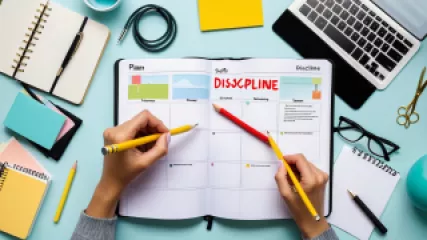Mastering Self-Discipline: A Step-by-Step Guide to Achieving Your Goals
Introduction
Self-discipline is a crucial skill that can significantly impact our ability to achieve our goals and lead a successful life. It involves having the self-control, focus, and determination to stay committed to our objectives, even when faced with distractions or challenges. While it may seem daunting to develop self-discipline, it is a skill that can be learned and improved with practice and guidance.
Why is Self-Discipline Important?
Self-discipline plays a vital role in various aspects of our lives, including personal growth, professional success, and overall well-being. When we have strong self-discipline skills, we are better equipped to:
- Achieve long-term goals: Self-discipline allows us to stay focused on our goals and take consistent action towards them, even when faced with setbacks or obstacles.
- Maintain healthy habits: With self-discipline, we can establish and maintain positive habits such as regular exercise, healthy eating, and sufficient sleep.
- Improve productivity: By practicing self-discipline, we can minimize distractions, prioritize tasks effectively, and manage our time efficiently, leading to increased productivity.
- Enhance decision-making: Self-discipline helps us make thoughtful and rational decisions by reducing impulsive behavior and considering long-term consequences.
- Build resilience: Developing self-discipline fosters resilience, allowing us to bounce back from failures and persevere through challenges.
Step-by-Step Guide to Mastering Self-Discipline
Step 1: Define Your Goals
The first step in mastering self-discipline is to clearly define your goals. Take some time to reflect on what you want to achieve in different areas of your life, such as career, relationships, health, or personal development. Write down your goals in a specific and measurable way, ensuring they are challenging yet attainable.
Once you have defined your goals, break them down into smaller, actionable steps. This will make them more manageable and allow you to track your progress along the way.
Step 2: Create a Plan
Developing a detailed plan is essential for maintaining self-discipline. Outline the specific actions you need to take to reach your goals and create a schedule or timeline to follow. Set deadlines for each step to keep yourself accountable and motivated.
Additionally, consider potential obstacles or distractions that may arise and devise strategies to overcome them. This proactive approach will help you stay focused and on track.
Step 3: Cultivate a Positive Mindset
A positive mindset is crucial for building self-discipline. Believe in your ability to achieve your goals and maintain a positive attitude, even when facing challenges. Surround yourself with supportive individuals who inspire and motivate you.
Practice self-affirmation and visualize your success regularly. By cultivating a positive mindset, you will enhance your self-discipline and increase your chances of accomplishing your goals.
Step 4: Develop Daily Habits
Consistency is key when it comes to self-discipline. Identify daily habits that align with your goals and commit to practicing them consistently. Whether it's waking up early, exercising, or dedicating time to learning, incorporating these habits into your routine will help strengthen your self-discipline.
Start small and gradually increase the difficulty or duration of these habits over time. Celebrate your progress and reward yourself for sticking to your commitments, reinforcing the positive behavior.
Step 5: Prioritize and Focus
One of the biggest challenges to self-discipline is managing distractions. Learn to prioritize your tasks and focus on one thing at a time. Avoid multitasking, as it can hinder your ability to concentrate and reduce productivity.
Eliminate or minimize distractions as much as possible. This may involve turning off notifications on your phone, creating a dedicated workspace, or practicing mindfulness techniques to enhance your focus.
Step 6: Practice Delayed Gratification
Self-discipline often requires sacrificing immediate pleasure for long-term gain. Practice delayed gratification by resisting temptations that may hinder your progress towards your goals.
Avoid impulsive purchases, unnecessary indulgences, or instant gratification activities that may distract you from what truly matters. Instead, remind yourself of the greater reward and satisfaction that comes with achieving your goals through disciplined actions.
Step 7: Seek Accountability and Support
Accountability and support can significantly contribute to improving self-discipline. Share your goals and progress with a trusted friend, family member, or mentor who can provide encouragement and hold you accountable.
Consider joining a self-discipline coaching session or finding an accountability partner who shares similar aspirations. Together, you can motivate each other, share experiences, and celebrate achievements along the way.
Step 8: Learn from Setbacks
Setbacks are a natural part of any journey towards self-discipline. Instead of getting discouraged or giving up, view setbacks as opportunities for growth and learning.
Assess what went wrong, identify areas for improvement, and adjust your approach accordingly. Embrace setbacks as valuable lessons that will ultimately strengthen your self-discipline and resilience.
Summary
Mastering self-discipline is a transformative process that requires commitment and practice. By defining your goals, creating a plan, cultivating a positive mindset, developing daily habits, prioritizing and focusing, practicing delayed gratification, seeking accountability and support, and learning from setbacks, you can enhance your self-discipline skills and achieve your goals.
Remember, self-discipline is not a one-time achievement but an ongoing journey. Embrace the process, celebrate your progress, and continue to nurture your self-discipline mindset for lifelong personal and professional growth.






